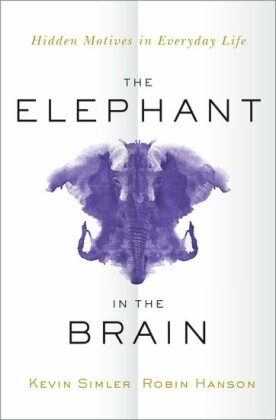
The Elephant in the Brain - Hidden Motives in Everyday Life
| Verlag | Oxford University Press |
| Auflage | 2018 |
| Seiten | 416 |
| Format | 17 cm |
| Artikeltyp | Englisches Buch |
| ISBN-10 | 0190495995 |
| EAN | 9780190495992 |
| Bestell-Nr | 19049599EA |
Human beings are primates, and primates are political animals. Our brains, therefore, are designed not just to hunt and gather, but also to help us get ahead socially, often via deception and self-deception. But while we may be self-interested schemers, we benefit by pretending otherwise. The less we know about our own ugly motives, the better - and thus we don't like to talk or even think about the extent of our selfishness. This is "the elephant in the brain." Suchan introspective taboo makes it hard for us to think clearly about our nature and the explanations for our behavior. The aim of this book, then, is to confront our hidden motives directly - to track down the darker, unexamined corners of our psyches and blast them with floodlights. Then, onceeverything is clearly visible, we can work to better understand ourselves: Why do we laugh? Why are artists sexy? Why do we brag about travel? Why do we prefer to speak rather than listen?Our unconscious motives drive more than jus t our private behavior; they also infect our venerated social institutions such as Art, School, Charity, Medicine, Politics, and Religion. In fact, these institutions are in many ways designed to accommodate our hidden motives, to serve covert agendas alongside their "official" ones. The existence of big hidden motives can upend the usual political debates, leading one to question the legitimacy of these social institutions, and of standard policiesdesigned to favor or discourage them. You won't see yourself - or the world - the same after confronting the elephant in the brain.
Rezension:
The argument that Simler and Hanson make is rather comprehensive, and compelling. They bring together research on various topics of limited reach that, when combined, speak to the outrageous gall of the mind in recreating reality to its own liking, and then covering its tracks. Katherine Oktober Matthews, Riding the Dragon
